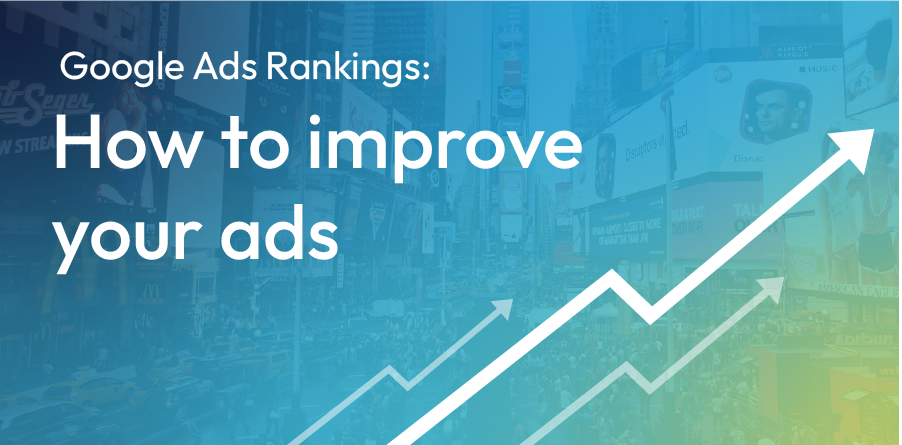Google Ad Rank: How to Improve Your Ads

Google Ads are a potent tool on a marketer’s toolbelt – when used properly. Like organic rankings, Google Ads must be carefully created, monitored, and optimized to earn great rankings on Google.
Where to begin? Start here!
In the following content, we explore the basics of Google Ad Rank, including how Google ranks ads. Then, we explore ways to improve the quality of your ads.
Let’s dive in!
What is Google Ad Rank?
Ad ranking is the position of your ad on a search engine results page (SERP). Ranking 1 puts your ad at the very top of the SERP.
How Does Google Rank Ads?
According to Google, six primary factors impact Ad Rank at a skyscraper level.
1. Budget (your bid)
Your budget plays a role in your Ads Rank. Your bid is the maximum amount you’re willing to pay for an ad click, even though the actual cost may be less. Bids can be changed at any time.
2. Ads & landing page quality
Ad and landing page quality is an expansive concept, one that we cover in more depth in a recent blog. In essence, however, Google evaluates how relevant and helpful your ad and your landing page are to your target audience (i.e. the audience actually searching the keyword(s) you're targeting). Helpfully, Google provides marketers with a Quality Score, found in your Google Ads account. This can be monitored and improved.
3. Ad rank thresholds
Ads must meet minimum Ad Rank thresholds. These thresholds determine an ad’s ability to compete in each ad auction and are based on ad quality, ad position, user signals and attributes, the topic and nature of the search, and related auctions.
4. Auction competitiveness
Competitive auctions are typically won by advertisements with better ad rank. However, great ad positions for competitive auctions can require a more expensive cost-per-click (CPC).
5. SERP context
Google takes the context of the SERP into account while ranking ads, including search terms, location, type of device used, time of the search, and other search results on that particular SERP – to name a few. It is important for marketers to create ads that are relevant to their target search terms, as well as the other SERP features on the results page.
6. Expected impact from ad extensions
Finally, Google takes into account ad extensions incorporated into your ad. Ad extensions are additional information, such as additional links or a phone number. Google estimates how these add-ons will impact your performance.
How to Improve Google Ad Rank
According to Google, better ads result in better Ad Rank. Google writes, “Every time someone does a search that triggers an ad that competes in an auction, we calculate an Ad Rank. This calculation incorporates your bid and auction-time measurements of expected CTR, ad relevance, and landing page experience, among other factors.”
Beyond Ad Rank, ad quality impacts:
- Auction eligibility – as mentioned, ads must meet certain Ad Rank thresholds to be considered in ad auctions. Poor quality ads may not be shown in the SERP at all.
- CPC – ad quality often corresponds to cost-per-click. Higher quality ads typically have lower CPCs.
- Eligibility for ad extensions – ad quality also determines eligibility for ad extensions, like site links and phone numbers.
Ultimately, improving ad quality is of utmost importance. How can this be done? We recommend focusing on three primary elements when improving your ads rankings: click-through-rate (CTR), ad relevance, and landing page quality.
Click-through-rate (CTR)
CTR compounds on itself, making it an extremely important metric! Marketers can begin to improve CTR by utilizing relevant ad extensions, incorporating negative keywords into the campaign, adding keywords to headlines, descriptions/ display URLs, and writing compelling ad copy.
Ad relevance
Is your ad relevant to the search term? Perform simple SERP research by typing in the keyword you are bidding on and evaluating the results! What kind of ads are displayed? Ecommerce ads, call ads, Google Business Profile ads? What kind of copy is being used? Simple SERP research can uncover the intent of the users searching the term and guide strategic creation of your ads campaigns.
Landing page quality
Landing page quality involves relevancy, user-friendliness, and keyword-placement. Follow a few best practices to optimize your landing page quality.
1. Ad-landing page relevance
Make sure your landing page relates to your ads. For example, if your ad features a baking course, send your paid traffic to a page selling your baking course. Don’t link to a page about how to start a home bakery. Relevance is key.
2. Loading time
40% of internet users will abandon a page that takes more than 3 seconds to load. In other words, your paid traffic will not patiently wait while your landing page loads for 5+ seconds. You can evaluate your landing page speed with a variety of paid tools, including Google PageSpeed Insights or Pingdom Website Speed Test.
3. Customize your landing page for each ad
Per best practice, only create one ad per landing page. This allows marketers to determine the ad bringing in conversions and, as mentioned, improves ad-landing page relevance. Consider building a beautiful landing page template on your website and duplicating for each ad. On every page, customize imagery and copy to create a unique page for each ad.
RivalMind: Google Ads Experts
As RivalMind, we have plentiful experience building successful Google Ads campaigns for clients in a multitude of industries.
Our paid search team implements cutting-edge research to continually improve our ad campaigns. We understand that the best Google Ads campaigns do not thrive by hoping for the best – they thrive on strategic creation, consistent attention, and regular evaluation.
To learn more about our paid marketing services, reach out at 331.228.9636, through our online contact form, or via DM on any of our social media channels.

Meet the Author
Harley Helmer
Director of Search Marketing
Harley Helmer is a digital marketing professional with nearly a decade of experience in the industry. Today, he's the head of search marketing strategy at RivalMind, responsible for developing and executing comprehensive SEO campaigns that improve online visibility and boost organic traffic. His pragmatic, no-nonsense approach to marketing – paired with a robust knowledge base – helps him deliver innovative solutions to technical challenges and deliver real client success.
Specialties: SEO Strategy, Google Ads, and Search Marketing Opinions
Looking for more organic website traffic?
Welcome to RivalMind. Our purpose is to help your business thrive. We are a digital marketing agency that offers SEO, PPC, Web Design, Social Media and Video Solutions as tools to our clients for online business development and growth.
Contact us today to get started!
Blog Contact Form
Connect with Us:




